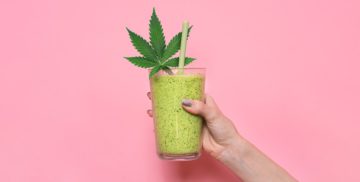CBD oil for Cancer has become a very popular alternative to Traditional Medicine due to numerous cases of individuals who are cured thanks to Cannabinoids.
What is the approach of the Traditional Medicine
Thanks to many Scientific studies Traditional Medicine is not denying the potential of CBD Oil in Cancer treatment but also not suggesting wide use of it and preferring old school approach which is based on the following taught:
“If the cancer is discovered in the early stage traditional approaches like Surgery, Chemotherapy, and Radiotherapy and could be effective.”
It is a well-known fact that traditional approach is very often followed with unwanted effects, as a result of that we have seen an increase of interest in different approaches to cancer treatment.
Can CBD Oil Help with Cancer Treatment?
There is a wealth of research hinting that CBD could help with cancer treatment, but until we have double-blind placebo-controlled trials in humans we cannot say for certain.
What can be is that the evidence from using CBD to treat human and animal cancerous cells has shown that CBD can kill cancer cells.
The potential is so great that eminent scientist and Nobel prize nominee Dr Raphael Mouchoulom when speaking to The Extract said: “There is no reason why we should not have human clinical trials into the potential of cannabis oil to cure cancer.”
If what has been shown in human cells and animals can be replicated in a human trial then we are talking about a complete game-changer. We are talking about a compound with the potential to kill cancer with completely mild side effects.
Understanding CBD
So what exactly is CBD Oil? CBD is a cannabinoid (compound) from the cannabis plant that has a host of medicinal benefits. Unlike its cousin tetrahydrocannabinol (THC), this multifaceted compound is non-intoxicating and as such, regardless of the quantity taken, will not produce the euphoric ‘high’ feeling typically associated with the cannabis plant.
Cannabidiol is a pharmacological wonder, with anti-anxiety, analgesic, antioxidant, anti-psychotic, and anti-convulsant effects. But it is the cytotoxic, anti-inflammatory, and antiemetic effects, in particular, that are of interest to people dealing with cancer.
CBD oil has been shown to have a remarkable safety profile both in anecdotal reports and in a detailed study of human clinical data. So exceptional was this plant cannabinoid that the researchers concluded that “CBD had a better side effect profile in comparison to most pharmaceutical drugs”.
Side Effects of CBD
Although rare, the most common side effects reported in published literature are:
- Tiredness
- Diarrhoea
- Changes in appetite/weight.
- Potential drug on drug interactions
Tiredness
Tiredness is a commonly mentioned side effect with 21% of participants in epidiolex (patented CBD) trials experiencing some form of tiredness. This is most common when taken in higher doses whereas smaller doses have been shown to actually contribute to greater alertness.
Diarrhoea
Exceptionally rare and hardly ever mentioned in the majority of human trials, diarrhoea is reported in 10% of epileptic patients who received epidiolex.
Changes in Appetite/Weight
Epilepsy clinical trials showed 16% of participants reporting a reduced appetite, with weight loss reported in 2% of participants.
Drug on drug interactions
Cannabidiol may interact with enzymes in your liver potentially increasing or decreasing pharmaceutical drugs.
This can potentially be a positive side effect as shown in one 13-week study of epileptic children who used CBD. The result was that these children were able to lower their anti-epileptic drugs which resulted in fewer side effects from these pharmaceutical drugs.
CBD Oil – As a Complementary Cancer Therapy?
The ability of CBD oil to kill human cancer cells in vitro and in animal studies suggests it may yet be lauded as a cancer treatment. As it stands this is not currently the case, but it may complement existing cancer treatment.
Stimulating Appetite
Chemotherapy-induced nausea and vomiting (CINV) can result in significant weight loss and, in turn, further health issues. CBD in conjunction with THC has been shown to stimulate appetite.
Pain Relief
CBD can relieve pain due to its ability to interact with serotonin levels, anandamide levels, and opioid receptors all of which are known to influence our perception of pain.
Nausea
Cannabidiol has been shown to suppress nausea in an animal model but is considered more effective when used in conjunction with THC. For those who do not enjoy the ‘high’ effect of THC, it is well worth noting that CBD has been shown to counteract and reduce this effect.
Can CBD be Used as a Cancer Preventative?
Researchers from the Korean Society of Applied Pharmacology determined, after seeing that CBD can kill cancer cells, that it was an anti-cancer agent. However, without long term clinical trials there is no way to know for certain just have many benefits CBD oil could have.
CBD may prevent cancer given its ability to influence both receptors in the central nervous system and more importantly CB2 receptors in the immune system by regulating bodily functions contributing to homeostasis.
Ways to Take CBD Oil
Topicals
Topicals include salves, balms, and creams that contain typical skincare ingredients infused with CBD oil. Topicals are applied directly to the site of pain or infection to work on that specific area.
Smoking or Vaping
Smoking and vaping CBD involves flower or oil being burned (smoked) or heated (vaped) and entering the lungs. Pulmonary absorption results in a rapid onset of effects. Those looking for immediate relief should opt for vaping rather than smoking as it does create the same toxins that combustion does.
Tinctures
Tinctures provide an easy, effective and ideal medium for precise dosing. Using a pipette, drops are placed under the tongue where there are numerous veins that quickly absorb the oil into the circulatory system.
Edibles
For some, the taste of cannabidiol can be too strong and if that is the case then CBD edibles such as delicious cakes, chocolates or gummy bears are all great options.
Capsules/Gelcaps
Capsules offer a precise method for those looking for accurate dosing. With different strengths available, as well as a vegetarian option, there is a capsule for everyone.
Oromucosal
Another fast and effective method similar to tinctures is the oromucosal
method in which CBD is sprayed into the mouth and gums and quickly absorbed into the circulatory system.
Intranasal
Using a special spray bottle CBD oil is breathed into the nose where thin mucosa absorb the oil for fast-acting results.
Rectal suppositories
For those who, for whatever reason, cannot swallow capsules, edibles, etc, there are suppositories which can be taken and are absorbed into the cellular walls and mucous membranes of the anus. The lower and middle veins allow CBD to bypass the digestive system, therefore rapidly entering the bloodstream
CBD And Cancer – What does the Research Say?
Since CBD oil was proven to prevent seizures in children and adults with rare forms of epilepsy, research has surged. As a result, we have provided synopses as well as links to the existing research pertaining to each individual cancer.
CBD and Pancreatic Cancer: In a 2019 study researchers showed that by interacting with CB2 receptors in the pancreas, CBD reduced tumour growth and induced tumour cell death without affecting healthy pancreas cells.
CBD and Lung Cancer: CBD has been shown to have anti-neoplastic effects in lung cancer cells. In 2008 Korean researchers cultured different cancer cells into various concentrations of ‘CBD’ for 6-48 hours. Cytotoxicity (ability to kill cancer cells) of ‘CBD’ increased in a dose-dependent manner with growth inhibition of all cancer cells.
In June 2014, further research showed how ‘CBD' can have an antitumorigenic effect on lung cancer cells inhibiting the formation of tumours.
CBD and Brain Cancer: Research is ongoing at the University of Nottingham into the potential of CBD to treat brain tumours. Speaking to The Extract, lead researcher Richard Grundy stated that early observations “have been able to show CBD does have an effect in [human] culture cells and we are learning how it [CBD] kills these cells. We believe [it works by] promoting autophagy and apoptosis (cell death).”
CBD and Kidney Cancer: Cultured kidney cancer cells were immersed in CBD for 48 hours resulting in reduced slowed cell growth and cell death. CBD was shown to work in a dose and time-dependent manner.
CBD and Breast Cancer: Breast cancer cells were shown to be less invasive when id1 (a regulator of breast cancer cells) was down-regulated. CBD was shown to reduce id1 in aggressive breast cancer cells leading to the down-regulation of tumour aggressiveness.
CBD and skin cancer: Research from Korea has shown that CBD can kill melanoma cancer cells and inhibit growth in a dose-dependent manner.
Is CBD Oil Safe to Take?
Yes CBD oil is safe to take and has been met with great applause as a remarkably safe pharmacological agent. There have been no known deaths attributed to cannabidiol and it has even been shown to be tolerated in humans at 1500mg doses.
Word of warning though as, similar to grapefruit juice, CBD can interact with enzymes in the liver potentially increasing or decreasing pharmacological drugs. Cancer patients concerned should check with their doctor prior to consumption.
Anecdotal Evidence
Following unsuccessful “conventional” treatments and being told he had just months left to live, English man George Gannon had no other options but to turn to cannabis oil to try and heal his brain tumours.
George took the oil several times a day and after 5 weeks the 29-year-old businessman from Basingtonstoke stunned doctors and family members as he started to get better. On the 15th of August this year, an MRI scan revealed over 95% of the tumours were gone.
George took a large dosage in his fight with cancer but how much is an optimum dosage?
A Guide for CBD Dosage
Cannabidiol has been shown, time and time again, to be dose-dependent and displays an inverted bell shape response meaning everyone will have a unique dosage amount.
As CBD is still considered a food supplement in the UK and as such there are no official guidelines from the HSE or any other governmental authority.
Thankfully there is plenty of information available for anyone choosing to take CBD but the best method of finding your optimum CBD dosage is probably the Dr Sulak method:
The Dr Dustin Sulak Dosing Method
Dr Dustin Sulak is a physician in Maine, USA, has constructed a simple easy to follow guide for finding the dosage that is right for you.
Regardless of which method of consumption you choose, vaping, gummies, tincture etc, Begin by taking a very small amount of CBD(1-5mg) in the morning and after one hour, you proceed to ask yourself the following 3 questions:
- How easy is it to breathe?
- How comfortable and calm does your body feel?
- How easy is it for you to smile naturally?
You then rate your scores from 1 – 10 and do this every hour.
If your scores are the same after the first hour then slowly increase your dose and rate yourself again using the same 3 questions.
Continue to do this until you feel a noticeable difference.
Eventually, you will reach the stage where increasing your dosage will not result in higher subjective scores meaning you have found your optimum dosage.
Conclusion
CBD is a truly phenomenal compound and its multifaceted medicinal properties are incomparable in the plant kingdom. No other plant can come close to the number of pharmacological functions that cannabis possesses.
Based on conclusive evidence of CBD’s impeccable safety record it would seem wasteful to not at least attempt to use this cannabinoid in the fight against cancer.
The world of medicinal journals is inundated with peer-reviewed papers highlighting and attesting to the potent potential of this wonderous cannabinoid, so much so that human clinical trials must proceed with some urgency.
Cancer patients and families in the UK are desperate for a solution. They are desperate for a solution to the greatest threat of their life. CBD, if replicated in human studies, could be the solution they are searching for, a medicine, which can be grown in their own garden.



















